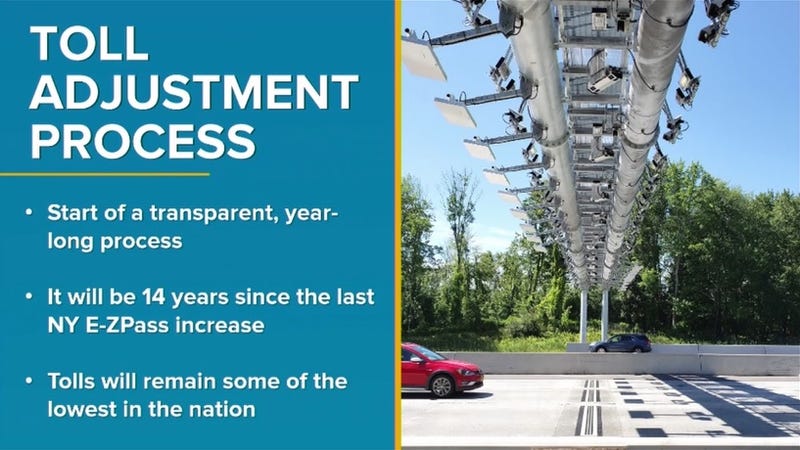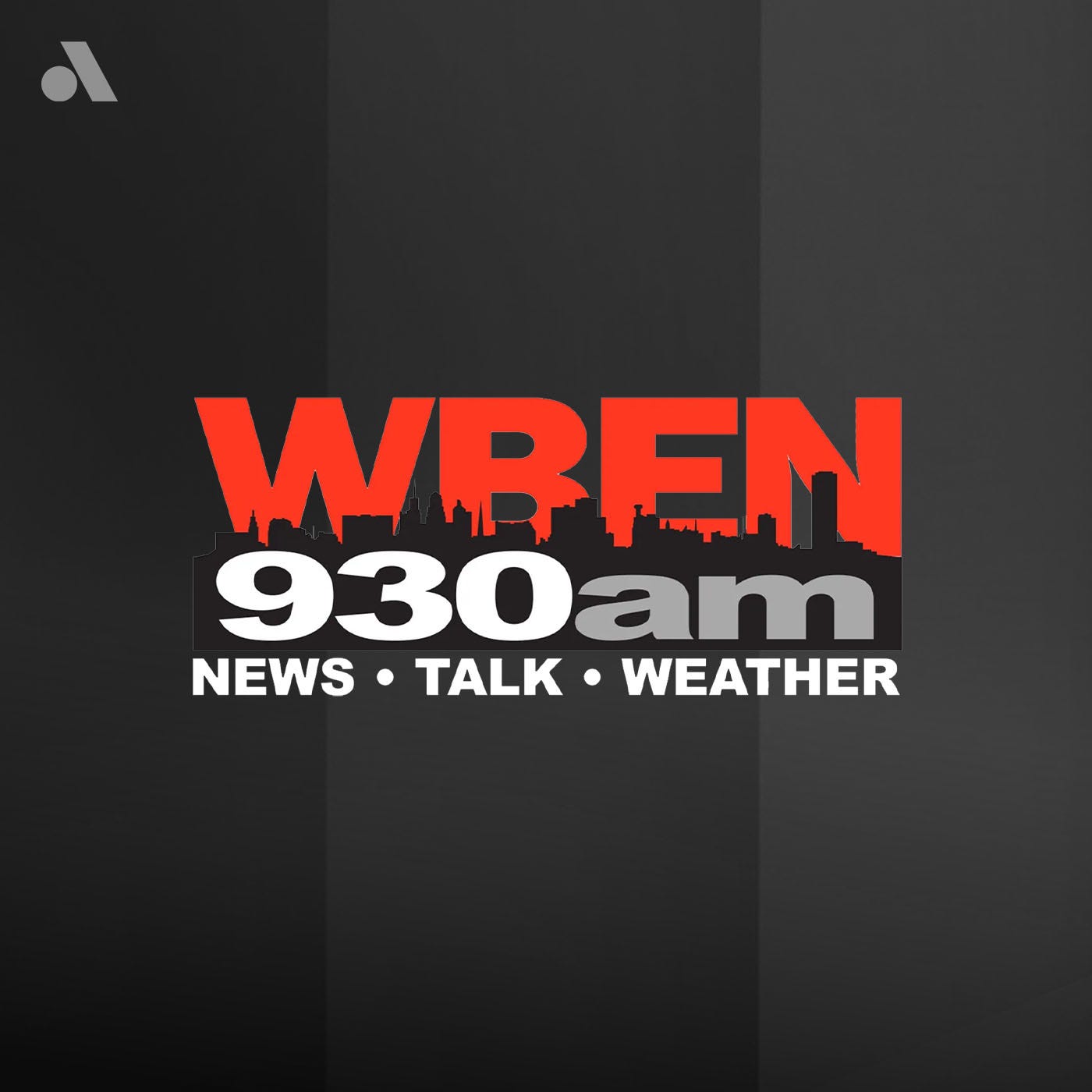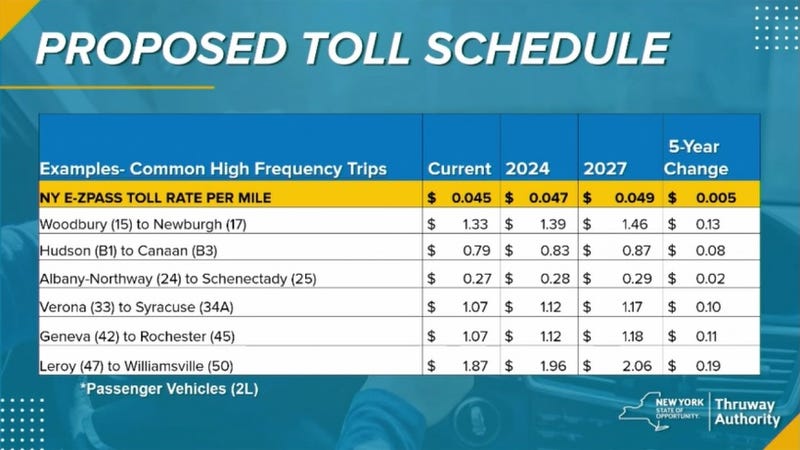
Albany, N.Y. (WBEN) - It was revealed last week the New York State Thruway Authority was set to begin the process of increasing its system-wide E-ZPass tolls by 5% starting in 2024, with an additional 5% increase in 2027.

The toll rate would increase by 75% for non New York E-ZPass users, as well as those tolls by mail travelers.
Rates would remain as-is for the upcoming 2023 calendar year.
During a board meeting on Monday, the New York State Thruway Authority discussed the proposed toll adjustments, with this allowing for the process to move forward. After the discussion that lasted nearly 20 minutes, the motion to advance the proposed toll adjustments on the Thruway were approved with a unanimous vote.
If approved and implemented starting in 2024, the tolls increase would be the first rate hike for E-ZPass customers in 14 years, with the last systemwide adjustment in New York State came back in 2010.
Given that the Thruway Authority currently receives no federal or state support for operations, tolls account for 90% of the resources needed to maintain and operate the system. The impact of this became very apparent when the Thruway Authority was confronted by the effects of the COVID-19 pandemic.
"In 2020, Thruway toll revenues declined by 17%, or $125 million from prior levels. This magnitude of this reduction was seven times greater than anything the Thruway really experienced in the last 40 years. In fact, we're still recovering that lost ground," said Matthew Howard, Chief Financial Officer of the Thruway Authority. "The current projection is that revenues will be about $240 million lower than what we had forecasted prior to COVID for the 2020 through 2025 period. Still, we have managed to weather that storm, and it's a tribute to everyone in the Authority and the strength of our organization that we were able to do so without the need of any federal or state COVID relief funds."
These financial revenue pressures are one of the major factors in the proposed toll hikes being proposed by the Thruway Authority starting in 2024. Another driving factor is for infrastructure needs along the Thruway that will only continue to grow over time.
"While we continue to invest our resources in the system, we also find ourselves managing aging infrastructure that was all put into service at roughly the same time in the 1950s," Howard said. "Further, in 2021, through a staff-conducted needs assessment that identified $470 million in capital project needs that are presently not supported by the resources that we currently have available for the '23-'26 capital program. This requires us to then shift and focus on the short-term solutions to maintain the service and safety and reliability of the road, and the near term at the expense of being able to support addressing the longer-term problem. And just like anything, when you can only focus on treating the symptoms, the longer you wait to address the underlying issue, the larger the problem becomes."
According to Howard, 75% of the Thruway's bridges are more than 60 years old, and 80% of the roadway foundation dates back to the original construction of the Thruway. All of this infrastructure will eventually need to be addressed, and the Thruway Authority believes it is imperative to start addressing the infrastructure of the Thruway in a responsible manner to ensure it remains one of the safest highways in the country.
While toll rates across the state will remain frozen at their current rates in 2023, Howard explains how the rates increase will work starting on Jan. 1, 2024.
"Base New York E-ZPass rates will increase by 5% on Jan. 1 2024 and 2027. In 2024, this plan will equalize the current 15% non-New York E-ZPass differential and 30% toll-by-mail differential, so they both will have a 75% differential from the New York E-ZPass rate," he said. "As a result, non-New York E-ZPass rates - currently 5.1 cents per-mile for passenger cars - and toll-by-mail rates - currently 5.8 cents per-mile - will both increase to 8.6 cents per-mile by 2027."
As of right now, some of the lowest toll rates in the nation are currently residing with New York E-ZPass holders, with toll rates for passenger vehicles at about 4.5 cents. Through this plan, the rate will increase in 2024 to 4.7 cents, and ultimately increase to 4.9 cents per-mile in 2027.
"Many states have toll rates that far surpass these proposed levels. Examples include the Garden State Parkway is about 40% higher than the current Thruway rate, the Indiana Toll Road is nearly double the current Thruway rate, and the Pennsylvania Turnpike is more than triple the current Thruway rate," Howard explained. "Even after adjusting these figures up by 5% in 2024 and 2027, Thruway toll rates are gonna remain below five cents a mile, but just as importantly, when we make that change, we don't even move up the list. We stay at the bottom, we're not even displacing another toll toll system on this."
How will this rate increase affect some of the more highly-traveled corridors along the Thruway?
According to the Thruway Authority, one of the more highly-traveled sections of the Thruway is the portion between Exit 47 (LeRoy) and Exit 50 (Williamsville). At the current rate, it sees E-ZPass drivers paying $1.87. With the 5% increase coming in 2024, it will see drivers needing to pay $1.96. Three years later in 2027, it will jump another 10 cents to $2.06.

The Thruway Authority continues to tell residents anywhere in New York can enroll in a New York E-ZPass, and for those who do, they will completely avoid the impact of the higher rates. Even with that being said, the Thurway's rates for out-of-state E-ZPass and toll-by-mail still fall well-below many other states.
In the end, though, this discussion held on Monday will hopefully begin the process of eventually including public hearings, and ample opportunities for public comments on the proposed changes. Following that, recommendations will return to the board for final approval.
"Beginning this process will hopefully lead us down the path toward addressing our aging infrastructure and revenue needs in a manner that builds on the fact that it's been 14 years since the last increase took effect, that maintains the Thruway's position as having some of the lowest tolls in the country, that supports a solid financial plan to meet our capital, operating expense and debt service obligations, and allows us to address the projected revenue requirements of the Authority, while continuing to provide the safety and reliability of the system that the traveling public has come to expect."
Hear more from Monday's board meeting discussion on the proposed toll hikes available in the player below:

